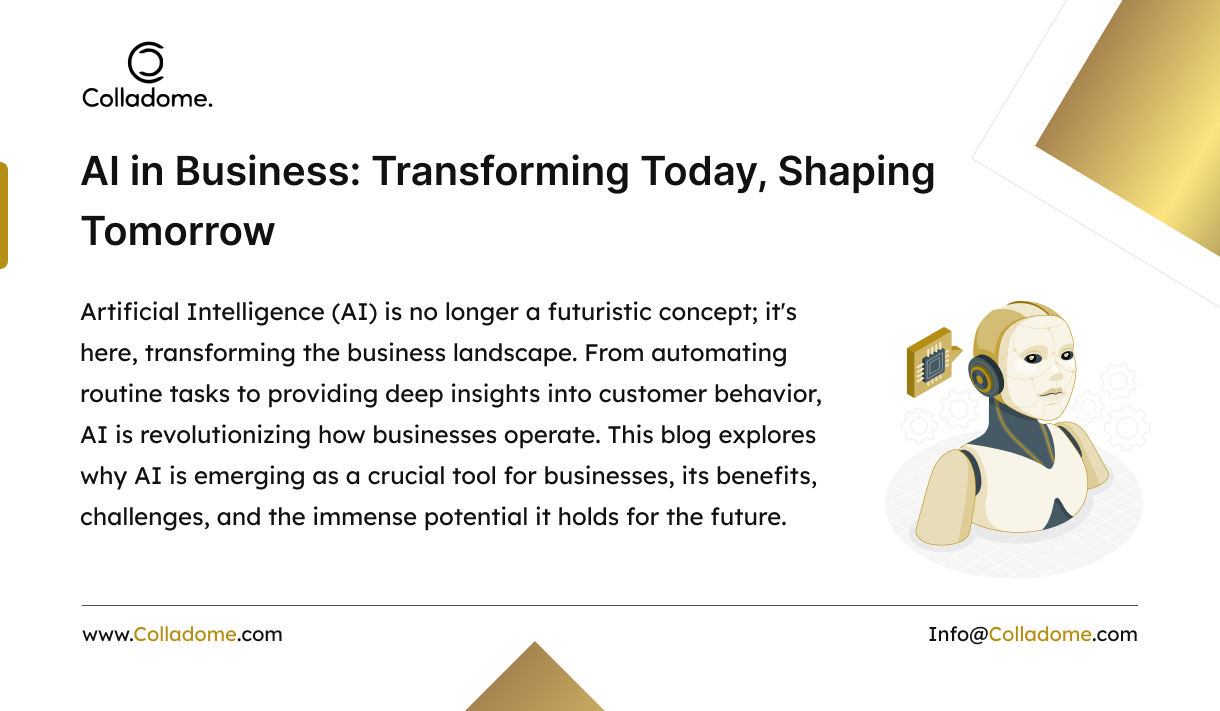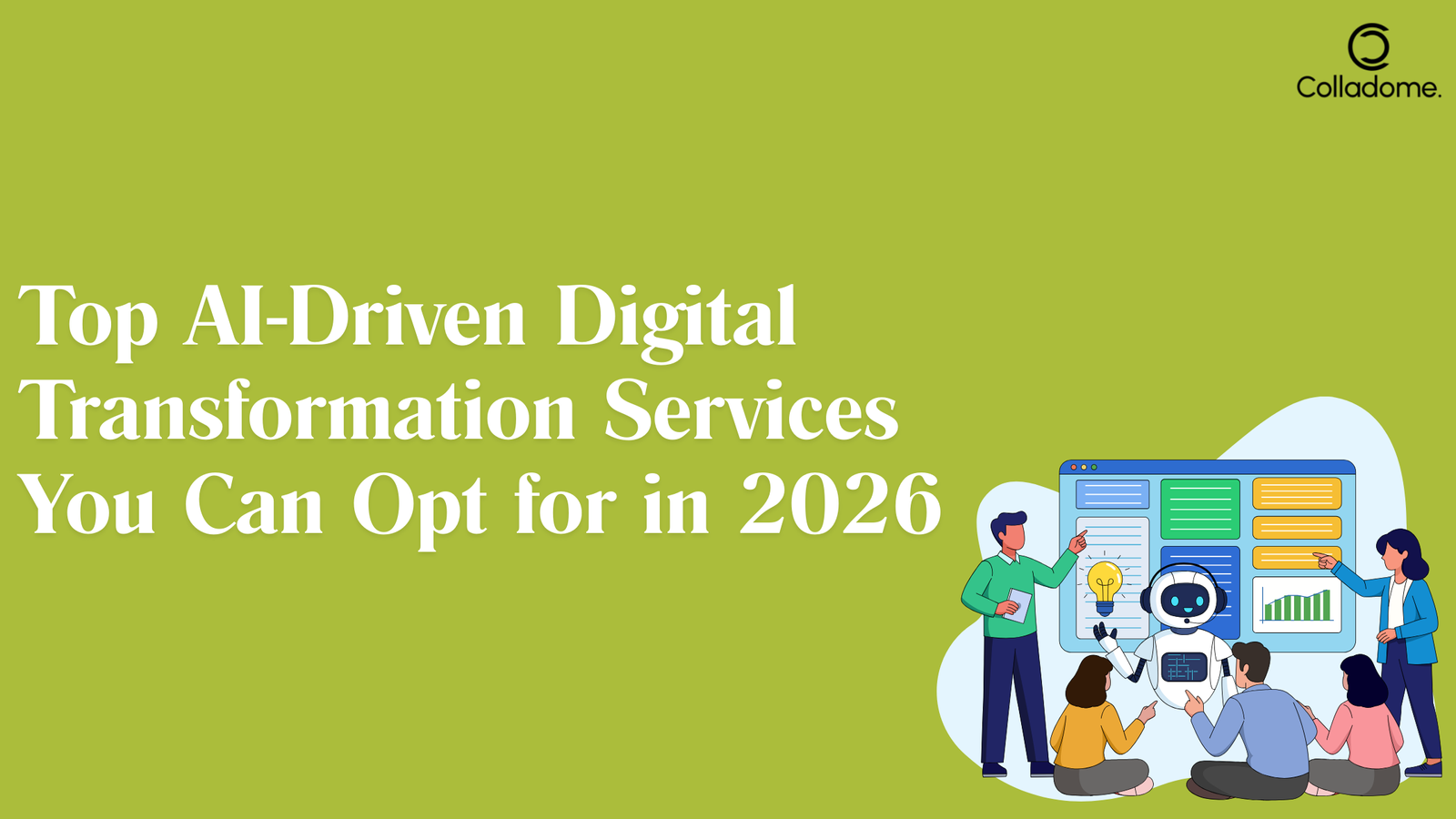Artificial Intelligence (AI) is no longer a futuristic concept; it’s here, transforming the business landscape. From automating routine tasks to providing deep insights into customer behavior, AI is revolutionizing how businesses operate. This blog explores why AI is emerging as a crucial tool for businesses, its benefits, challenges, and the immense potential it holds for the future.
Why AI is Emerging in Business
Increased Efficiency and Productivity
AI enables businesses to automate routine and time-consuming tasks. According to a report by McKinsey, AI can boost productivity by 40% or more. Automation of repetitive tasks allows employees to focus on higher-value activities, enhancing overall efficiency.
Enhanced Decision-Making
AI provides businesses with data-driven insights, enabling more informed decision-making. By analyzing vast amounts of data, AI can uncover patterns and trends that human analysts might miss. This capability is particularly beneficial in industries such as finance, healthcare, and marketing.
Competitive Advantage
Incorporating AI into Transforming business processes can provide a significant competitive advantage. Companies that leverage AI are often more agile and responsive to market changes. A PwC survey found that 72% of business leaders believe AI will be the business advantage of the future.
“AI will most likely lead to the end of the world, but in the meantime, there’ll be great companies.” – Sam Altman, CEO of OpenAI.

Benefits of AI in Business
Improved Customer Experience
AI-powered chatbots and virtual assistants enhance customer service by providing instant responses and personalized interactions. Gartner predicts that by 2025, customer service organizations that embed AI in their multichannel customer engagement platforms will elevate operational efficiency by 25%.
Cost Reduction
AI helps in reducing operational costs by optimizing processes and resources. For instance, AI-driven predictive maintenance in manufacturing can reduce downtime and maintenance costs by up to 30%.
Innovation and New Opportunities
AI opens up new avenues for innovation. It enables Transforming businesses to develop new products and services, optimize supply chains, and enter new markets. For example, AI-driven analytics in retail can predict consumer trends, helping businesses to stock the right products.
“The real value of AI is in its ability to augment human intelligence and help us make better decisions.” – Andrew Ng, Co-founder of Google Brain.
Challenges of AI in Business
Implementation Costs
While AI offers numerous benefits, the initial cost of implementation can be high. This includes investing in technology, infrastructure, and skilled personnel. However, the long-term benefits often outweigh these initial costs.
Data Privacy and Security
With AI relying heavily on data, concerns around data privacy and security are significant. Businesses need to ensure they comply with data protection regulations and implement robust security measures to protect sensitive information.
Skills Gap
There is a notable skills gap in the AI field. Businesses need professionals with expertise in AI technologies, which can be hard to find. Investing in training and development is essential to bridge this gap.
Impact of AI on Business
Transformation of Job Roles
AI is transforming job roles, automating routine tasks, and creating new job opportunities. According to the World Economic Forum, AI is expected to create 97 million new jobs by 2025. However, it will also render certain job roles obsolete, necessitating reskilling and upskilling of the workforce.
Enhanced Business Intelligence
AI enhances business intelligence by providing deeper insights into market trends and customer behavior. This capability allows businesses to make more strategic decisions and stay ahead of the competition.
Sustainable Practices
AI can help businesses adopt more sustainable practices. For example, AI-driven supply chain optimization can reduce waste and improve resource efficiency. A study by Capgemini found that AI-enabled environmental applications could help reduce greenhouse gas emissions by 4% by 2030.
“AI is not just a new wave. It’s the tide that lifts all boats.” – Sundar Pichai, CEO of Alphabet Inc.
Potential of AI in Business
Personalized Marketing
AI’s ability to analyze consumer data allows businesses to deliver highly personalized marketing campaigns. This targeted approach can significantly improve customer engagement and conversion rates.
Autonomous Operations
The future of AI in business includes the potential for fully autonomous operations. From self-driving vehicles in logistics to automated inventory management in retail, AI could lead to significant advancements in efficiency and productivity.
Advanced Predictive Analytics
AI’s predictive capabilities are continually improving, enabling businesses to anticipate market trends, customer needs, and potential disruptions. This foresight can help businesses proactively adapt their strategies and remain competitive.
Embracing AI with Colladome
“The future is not AI versus humans; it’s AI with humans.” – Ginni Rometty, former CEO of IBM.
AI is undoubtedly transforming the business landscape, offering numerous benefits, from enhanced efficiency and decision-making to improved customer experiences and cost reduction. However, businesses must also navigate the challenges of implementation costs, data privacy, and the skills gap. The potential of AI is immense, promising innovations in personalized marketing, autonomous operations, and predictive analytics. As businesses continue to embrace AI, those that do so effectively will gain a significant competitive edge in the market.
At Colladome, we understand the transformative power of AI and harness it to boost our productivity and creativity. Most of our meetings are recorded via AI note-taker, allowing us to easily share insights with clients and teams. When we gather initial requirements from clients, AI helps create a comprehensive scope document that we then fine-tune, significantly reducing our turnaround time. AI is integral to our project management, copy generation, content creation, and even idea generation and brainstorming sessions. By leveraging AI, we streamline our processes, enhance our productivity, and generate more innovative ideas.










